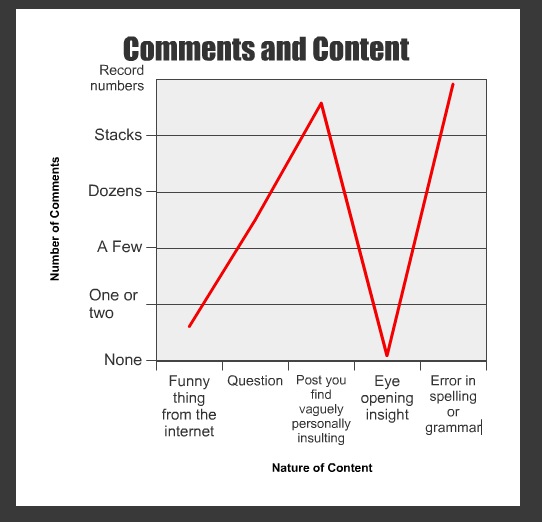A long time ago, in a virtual galaxy not so far from me, people used to comment on blogs as a blogging love language. I knew that, It was blog etiquette. Somehow that world passed me by. And I miss that.

Image Credit: Apparently there’s a conference called blog world. Who knew? (This guy)
I have commented much more sparingly than I used to. Others seem to have a similar blog comment malaise. I’m going to do my bit to hold up my end of the social (media) contract. And be more appreciative of the good content other people are writing that I’m thinking about.
Here are some links, rather than comments, as my first step towards rectifying this situation.
Andrew has pretty much killed Things Findo Thinks, replacing it with A Borrowed Flame. I liked this SLR camera simulator he found.
Anna at Goannatree has been writing about writing about writing. She’s posting about her PhD, which is about literature. Which is pretty meta. I enjoyed this post, which came hot on the heels of this one about a week of dissertation themed life in Scotland.
Al writes nice little posts, and I like them. His posts about Tim Chester’s posts about Social Media made me grumpy, not at him, at Tim Chester. So angry I commented on the first one. Also, his post about preaching at weddings is something I’m going to file away for the future.
Ali posted something last week about her near brush with a raving gunman in Sydney, and this week introduced me to The Tallest Man on Earth. She also tagged me in a book spine poetry meme which I will participate in once my books consist of something other than light reading on Corinthians and the Pentateuch.
Arthur and Tamie are getting ready to finish life in Melbourne, start life as parents, and start life in Tanzania. Their posts are fun. I liked this one.
Ben has a new theme. Which looks nice – though for some reason the first second after you load it the fonts are really effeminate, only to be replaced with the felt tip styled ones.
David posted a good little review of the 2 Ways 2 Live App, and a better post about marriage and stuff.
Izaac has been pondering preaching, I commented on two of those because I think the idea that word ministry is ONLY preaching is a bit spurious and doesn’t fit with the Bible’s picture of prophetic ministry, or the way Paul conceives of his teaching of the churches he cares for to include his life and sufferings.
Mikey posted about the search for black curtains, spiritually inspired cake, and excellence – following this discussion on Hans’ blog. Hans has an excellent post on Christianity and homosexuality too.
Steve at Communicate Jesus also reflects on the excellence thing.
Peter Ko posted on a strange issue (I thought). Apparently there are young Christians who think it’s a good idea for unmarried Christian couples to holiday together. Alone. And further, that it’s a bad idea for people to be “legalistic” about the issue. This isn’t legalism. This is wisdom. And thus, I became an old person.
Simone has been writing reports and musicals.
This isn’t a comprehensive list of the posts I’ve enjoyed from the blogs that I read, but I hope that in some way it makes amends for my poor online citizenship in recent times.
UPDATE: I completely forgot this one. Which was, indeed, the motivation behind providing a list to blogs I enjoy. Dave McDonald has started a blog tracking his fight with cancer, and the thoughts that go with it. This sensational letter to Sam Harris is a fine example of what he’s producing and why you should read it. Plus – it’s a great way to keep him, his family, and those around him, in your prayers.

How I’m hoping to aid clarity in online discussion
Some of the responses to some of my recent posts have been interesting. There are now more people reading St. Eutychus that I don’t know than there are people who I do. People who haven’t been following along for the six years I’ve been posting on this blog. So I’ve done some housekeeping.
I’ve updated my about page to be something more substantial than a staccato list of definitive factoids about me.
I’ve created a comment policy.
And I’ve edited my disclaimer.
I’m going to expect that people who comment here have familiarised themselves with these before they attack me (not before they comment), so they’ll be useful to refer people to. But they also say something about why I blog, what I blog, how I see this blog, and how I see conversation on this blog. They provide the interpretive context for reading each of my posts.
I’d love your feedback on each, or all of these – especially if you think my expectations are ridiculous or I’m incredibly wrong about any of it.
While I was doing some housekeeping I moved the Facebook comment form off the home page and onto each individual post, where previously it was on both. It was slowing down the page too much and a little too cluttered. Clutter reduces clarity.
October 20, 2012